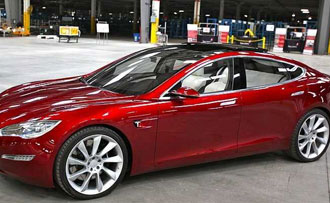Tesla appears to be seeking a China-based joint-venture partner to help it service half of the global demand for its luxury all-electric cars.
Speculation has been heating up as to Elon Musk’s choice of a Chinese partner since he recently revealed that the Chinese market already accounts for half the sales of Tesla’s $70,000-plus Model S all-electric sedans.
At the moment the frontrunner for the role of Tesla’s Chinese partner in the rumored pending alliance is truck-maker Anhui Jianghuai Automobile Co (JAC), according to Shanghai’s Economic Observer. JAC has sold more than 4,000 units of its all-electric J3 between its debut in 2010 and the end of 2012, nearly a quarter of all Chinese-made electric cars sold to private buyers in China during that span. With a range of over 80 miles, similar to that of the Nissan Leaf, the J3 was the second best selling electric car in China after the Chery QQ3 EV. JAC is a publicly-traded company that enjoys strong support from the city of Hefei, the capital of Anhui province.
The speculation is fueled by recent JAC talk about bringing in a strategic investor coupled with its executives’ admiring mention of Tesla on several occasions. Adding more fuel to the speculation is Musk’s recent announcement that Tesla’s expansion plans definitely include setting up production in Asia, both to cut costs and to get closer to its customer base.
Tesla and JAC is said to have agreed to a 5 billion yuan ($817 million) 50-50 joint venture to produce electric cars, according to a recently published business report which was subsequently denied by JAC.
But JAC isn’t the only potential partner for Tesla. Others include BYD, Chery and Huayu Automotive Systems, a subsidiary of SAIC, GM’s China joint-venture partner.
Tesla is also trying to resolve a dispute with a man who had trademarked the Tesla name in 2006 for the sole purpose of selling it to Musk’s company for $32 million. While the case winds its way through the courts Tesla is making plans to use the alternative name “Tousule”, the Cantonese transliteration of “Tesla”. That case may be one reason Musk has so far been reluctant to get too specific about details of the China joint venture.
The precise identity of the China partner and details about a joint venture remain speculative, but there’s little reason to doubt that Musk is pursuing one. Tesla’s US sales are already on par with conventional luxury-car makers BMW, Mercedes-Benz, Audi in the $70,000-and-up segment, and China’s luxury auto market is already twice the size of the US market.
Musk’s plans to introduce a Model X SUV late next year and to install over 200 super-charging stations across the US will likely put Tesla in the driver’s seat in the popularization of pure electric cars. Unless it moves quickly to stake out a similar position in China, it could be shut out of the biggest market of all. Beijing would love to foster Chinese dominance of the segment as a way to address near-crisis levels of air pollution in the nation’s largest cities while nurturing a segment identified in its current five-year economic plans as a key high-tech industry of the future.


